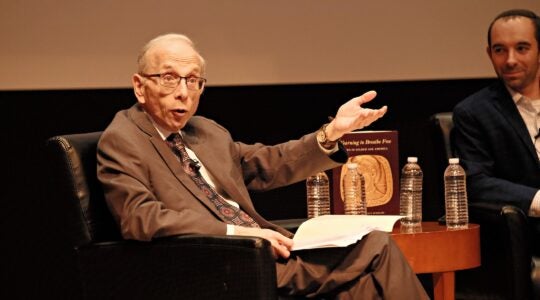While the U.S. presidential election is now behind us, President Obama still has 10 weeks left in his presidency.
Over the past few months, there has been speculation that, in the waning weeks of his administration, the president might seek to act on the Israeli-Palestinian peace process, an issue that has frustrated his efforts for close to eight years.
The White House has remained silent about press reports that he might lay out U.S. parameters for a peace deal, or authorize our United Nations delegation to abstain or even vote “yes” on a Security Council resolution condemning Israeli policies or recognizing a Palestinian state. Concern that such ideas may be under consideration led a bipartisan group of 88 U.S. senators to send a letter to Obama in September urging him “to continue longstanding U.S. policy and make it clear that you will veto any one-sided UN Security Council resolution that may be offered in the coming months.”
The president should resist the temptation to impose an external solution on the Israeli-Palestinian conundrum.
History shows that when neighboring Arab governments proved willing to recognize the State of Israel and come to the negotiating table, the issues dividing the parties were solved and peace was achieved. That happened when Egyptian President Anwar Sadat flew to Jerusalem in 1977, and announced to the Israeli Knesset that he wanted peace. It launched a negotiating process that led to an agreement in 1979, whereby Israel returned the entire Sinai Peninsula to Egypt, and the two countries established diplomatic relations that remain unbroken to this day. Similarly, in 1994, Israel and Jordan negotiated a peace treaty that involved the return of land, an arrangement over water rights and the initiation of diplomatic relations that have lasted to the present.
In striking contrast, the Palestinian leadership has broken off serious peace talks with Israel several times since 2000, most recently those facilitated by U.S. Secretary of State John Kerry in 2013-14. In February 2016, the Palestinian foreign minister stated categorically that his side would “never go back and sit again in direct Israeli-Palestinian negotiations.”
Instead, Palestinian Authority President Mahmoud Abbas encourages outside parties to launch one-sided criticisms of Israel and exert international pressure in the hope of forcing unilateral Israeli concessions. Among these are recent Palestinian-inspired resolutions on Jerusalem approved by UNESCO, in a blatant attempt to deny the intimate Jewish and Christian links to the city. Another example is the current Palestinian campaign to indict Great Britain for issuing the Balfour Declaration in 1917. That document announced support for a Jewish national home in Palestine, and set the stage for the UN General Assembly resolution of 1947 that called for establishing two states in Palestine, one Jewish and one Arab, which the Jews accepted and the Arabs rejected. In short, Abbas chooses to “whitewash” history rather than address the important issues necessary to achieve a lasting peace.
There can be no peace unless Abbas is willing to negotiate. If Obama is intent on leaving a legacy in this arena, he should exert American diplomatic leverage on the Palestinians to sit and talk rather than resort to appeals to outside parties to pressure Israel. He should convince them to accept the repeated invitations of Israel’s government to join it in face-to-face peace talks. He should ask Abbas to respond to Prime Minister Netanyahu’s public invitation to “speak to the Israeli people at the Knesset in Jerusalem.”
Only the U.S. can stop the dead-end strategy of the Palestinians, and only the U.S. can make clear that the right venue for advancing the peace process is not the UN Security Council chamber but the Israeli-Palestinian negotiating table. We hope President Obama can encourage President Abbas to remember the words of John F. Kennedy: “Let us never fear to negotiate.” That would be an important legacy.
The New York Jewish Week brings you the stories behind the headlines, keeping you connected to Jewish life in New York. Help sustain the reporting you trust by donating today.




